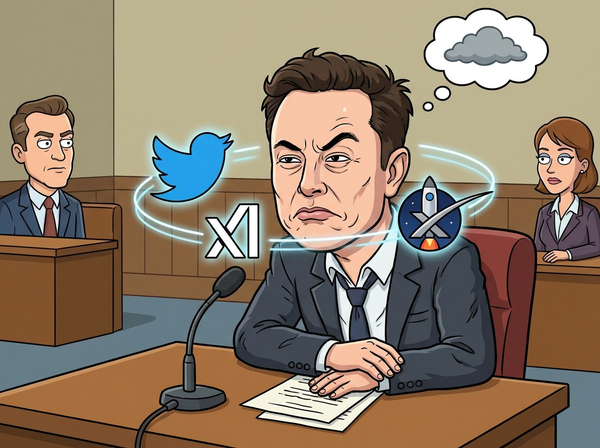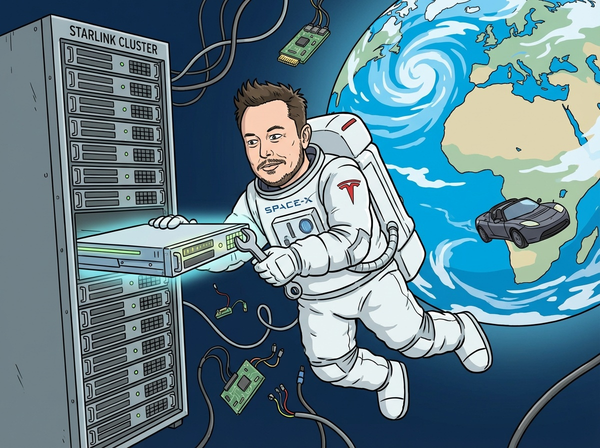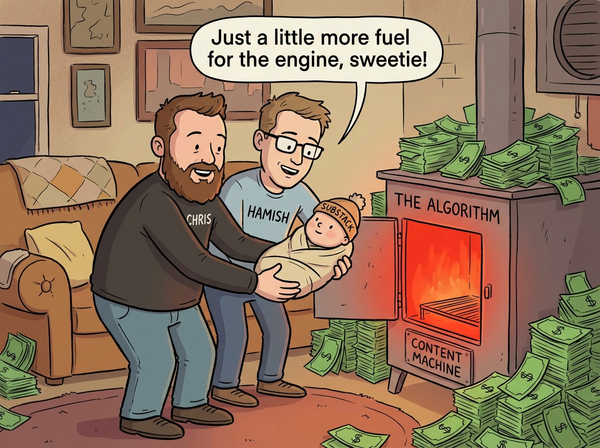The internet is breaking: AI slop is destroying the business model
AI slop is killing the business model of the internet, and it is going to lead to a lot of bad things. We are seeing much of it play out in real time.

By and large, the internet as we know it is in trouble.
If you think back to when you started surfing (depending on your age) it is likely that you felt awe when you saw the google start page:

You knew that you could type in, well, anything, and you would get lots of links to sites that could answer any question you might have. And you rarely had to go to the second page to get a good answer.
If you were like me in the mid 2000's, you could use it to seek out companies that sold medical grade stainless steel hardware for orthopedic implant (think plates to help a badly broken leg heal - I worked in a company that made instruments to do quality control for such parts) Google's search was a rabbit hole to go down. (I am sure you have your own example to share)
And that mythical "page rank" algorithm helped me to find markets, identify opportunities, do competitive analysis, and to even do preliminary market sizing (SAM/TAM/SWOT etc.[1]).
The magic was Google scraped the entire web, and did some magic behind the scenes to ensure that you got good links to go a'hunting.
They used paid advertising to fund this undertaking, and at the time, it seemed like a good trade. And these advertising dollars made Alphabet, Google's parent company, one of the most valued corporations on the planet.
A good trade, at least I thought so at the time.
This advertising model enabled news sites (WaPo, NY Times, WSJ and others) to fund staffs of professional trained journalists that could do local, national, and international reporting, backed with editors, fact checking and legal review. [2]
Because it takes a lot of money to do that, the cycle is:
- Pay journalists to dig up a story, editors to mash it into shape, and legal departments to ensure that you aren't open to slander or libel suits
- Post it online so people can read it
- People come to it, and you make money either with subscriptions or by serving ads
- Google (et. al) scrapes it, analyzes it, and it becomes part of their corpus of search results
- People search and if what you wrote is good, ranked high, they would find it and click through so that you can serve more ads, and make more money so you can hire (or continue to employ) reporters
Continue ad nauseum.
This wasn't always great, and wave after wave of clickbait headlines, and Serach Engine Optimization, and "sponsored links" kept fucking with the cycle, but if you wrote good stuff, people would find it, read it, and as a creator, you felt good about it.
AI is fucking all of that up.
How AI is disrupting the web
The video below is one of my favorite commentators of financial and business topics. Patrick Boyle's analyses and his dry, British wit combine to explain the situation, and how this is applying pressure to the increasingly fragile underpinnings of the internet's business model.
First, the number of searches is down, as more people are just going to their preferred chat-bot to ask questions, and accepting those answers, moving on without ever even doing a search.
Second, all of the major search sites (and by major I mean Google, Bing, Yanex, and Baidu) are prepending 'AI summaries' that increasingly people are satisfied with, and they never even scroll down below the fold to get to any relevant links.
That means that traffic to sites is way down (regardless of how much Google wants to whitewash this trend) and that is causing a collapse in funding from ads, and putting strain on the news side of the business.
Now, you might be of the opinion that sites like The NY Times, The Washington Post, The Atlantic, and others all are dinosaurs that should die, replaced by plucky writers on Substack and Medium where the audience pays for what they want.
Patrick also points out that is a not great answer. Because doing real reporting is more than making observations, adding some conjecture and possible context, and hitting publish. Reporters spend their time (and their company's expense account dollars) to establish relationships with sources, building trust, and a rolodex that can help cross reference, collaborate and confirm facts.
Most of what I read on Substack and others are at best opinion pieces (like this is my opinion), commentary on what others researched. Nothing wrong with that, but it is what I like to call "breathing our own exhaust".
Not wrong, not bad, but not news. As an example, I will point out that "News Sites" like Meidas Touch, BTC, and Aaron Parnas (I could pick on sites from left and right) are really just opinion stated as facts, and their primary focus is to get eyeballs, and paid subscribers on Substack, or views/subscribers on Youtube to monetize.
In the run up to the election last November, I consumed a fair bit of MTN and BTC on YT, and it was really a lot of repackaged generalities, with a progressive overlay to attract a certain class of people. It was an echo chamber, amplifying every think wisp of hope that Harris would thump Trump. Alas, I read enough outside that space to realize that it wasn't so rosy, and that at best it was a coin flip election.
Those sites routinely pilloried the legacy media[3] and using this ridicule to push their agenda.
AI is making all this worse, the legacy media still has a role to play, but AI is starving it of resources.
We all suffer, and are intellectually starved by what is the new normal, and it will get much worse.
Patrick references a video by a physics "influencer" Angela Collier. I will admit she's an acquired taste (I like her, and her style, but I did get a physics degree). Below is the full video, it is worth watching more than that clip Patrick includes:
1 - if you get those acronyms, you are in marketing
2 - I should point out that professional journalists are a very clique-esque group, where there are lots of groupthink, and swimming together like a school of fish
3 - I no longer call it MSM or mainstream media, it really is legacy media.




